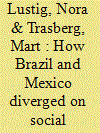|
|
|
Sort Order |
|
|
|
Items / Page
|
|
|
|
|
|
|
| Srl | Item |
| 1 |
ID:
185908


|
|
|
|
|
| Summary/Abstract |
Aiming to contribute to the debates on the entanglements among the far-right and anti-feminism Latin America, this article seeks to shed light on the performance of Damares Alves as Brazil’s Minister of Women, Family and Human Rights. Regarding Alves’s conservatism along her political career, particularly during the 2018 presidential run, this study provided an analysis on the reasons behind her prominence to the ongoing bolsonarism, and on how she contributed to building the gender knowledge that anchors the populist narrative in Bolsonaro’s political project. Concerning anti-feminist project’s foundations, as well as Alves’s performance as a Christian-conservative woman, a set of her speeches in the first 19 months of her term was scrutinised, by adopting the FCDA as methodology and using the thematic analysis as a method. The pointing of Alves’s discursive strategies revealed her attacks on feminisms, and the aim of legitimising herself and Bolsonaro’s political project as pro-women.
|
|
|
|
|
|
|
|
|
|
|
|
|
|
|
|
| 2 |
ID:
188676


|
|
|
|
|
| Summary/Abstract |
This paper engages with debates over the Liberal International Order (LIO) and Latin America by focusing on Brazil. More specifically, it addresses President Jair Bolsonaro’s foreign policy. His radical-right populist and religious-infused approach has been characterised by an explicit rejection of practically all elements of the LIO, including multilateralism, multiculturism, and regionalism—historically core features of Brazilian foreign policy. We seek to answer two interrelated questions: (1) what were the political conditions—domestic and international—that allowed for such dramatic foreign policy change? (2) what impact is Brazil’s new foreign policy orientation having on the LIO? To address them, we resort to the aspirational constructivist theory, which has allowed us to theorise Brazil’s new identity formation. We argue that Bolsonaro has reshaped Brazil’s foreign policy as part of his endeavour to create a national self-image based on three pillars: anti-globalism, anti-Communism, and religious nationalism. By doing so, the Bolsonaro administration has transformed Brazil, otherwise an avid supporter of the LIO, into one of the order’s most vocal critics. While anti-globalism (and, subsidiarily, anti-Communism) undermines the normative and institutional foundations of the LIO, religious nationalism offers a replacement to the order, based on independent ethno-nationalist communities. If Brazil’s radical right populist model spreads across Latin America, it has the potential to hollow out the region’s support to the LIO.
|
|
|
|
|
|
|
|
|
|
|
|
|
|
|
|
| 3 |
ID:
185627


|
|
|
|
|
| Summary/Abstract |
Mexico and Brazil, both among the region’s hardest hit by COVID-19, took strikingly different steps to mitigate the economic impact of the pandemic. Although President Jair Bolsonaro dismissed the need for social distancing measures, the government provided substantial financial aid to citizens though cash transfer programs, avoiding potentially sharp increases in poverty and inequality. Mexican President Andrés Manuel López Obrador, who also displayed a dismissive attitude about the virus, made relatively little effort to protect the poor and unemployed from its effects, despite his pro-poor rhetoric. As a result, the Mexican economy was projected to contract by 9 percent in 2020, while poverty sharply increased. Rising malnutrition and missed schooling may have long-term consequences for inequality.
|
|
|
|
|
|
|
|
|
|
|
|
|
|
|
|
| 4 |
ID:
185742


|
|
|
|
|
| Summary/Abstract |
This article uses the lens of neglect to analyze Brazil’s response to the COVID-19 pandemic. It argues that the neglect of COVID-19 was the result of a mixture of omissions, obstructions and actions on the part of the federal government and President Jair Bolsonaro. It also suggests that addressing Brazil’s handling of the pandemic as simply a matter of governmental failure risks overlooking the multiple forms of resistance and struggle that emerged as social forces mobilized and sought to push back against the state’s neglect.
|
|
|
|
|
|
|
|
|
|
|
|
|
|
|
|
| 5 |
ID:
177654


|
|
|
|
|
| Summary/Abstract |
China has become an important dimension of US relations
with Latin America and the Caribbean (LAC). In the last twenty years, China has increased its trade, investments, financial,
and political ties with the region, an area of US influence for
most of the twentieth century. As has been the case globally,
the Trump administration has increased its pressure against
China in LAC. The Brazilian experience shows that countries
in the region are being pressured to make policy choices that
effectively require them to renounce their own interests in
response to Washington’s demands. Both the United States
and China are crucial partners to LAC and the possibility of
being forced to choose between them is among the main
strategic risks the region faces
|
|
|
|
|
|
|
|
|
|
|
|
|
|
|
|
| 6 |
ID:
189705


|
|
|
|
|
| Summary/Abstract |
Despite Jair Bolsonaro’s persistent efforts to undermine public trust in the 2022 election results, his defeat was upheld and Luiz Inácio Lula da Silva returned to the presidency. But the subsequent storming of government offices by Bolsonaro’s supporters, along with other challenges facing Lula, left the country at an uncertain juncture.
|
|
|
|
|
|
|
|
|
|
|
|
|
|
|
|
|
|
|
|
|